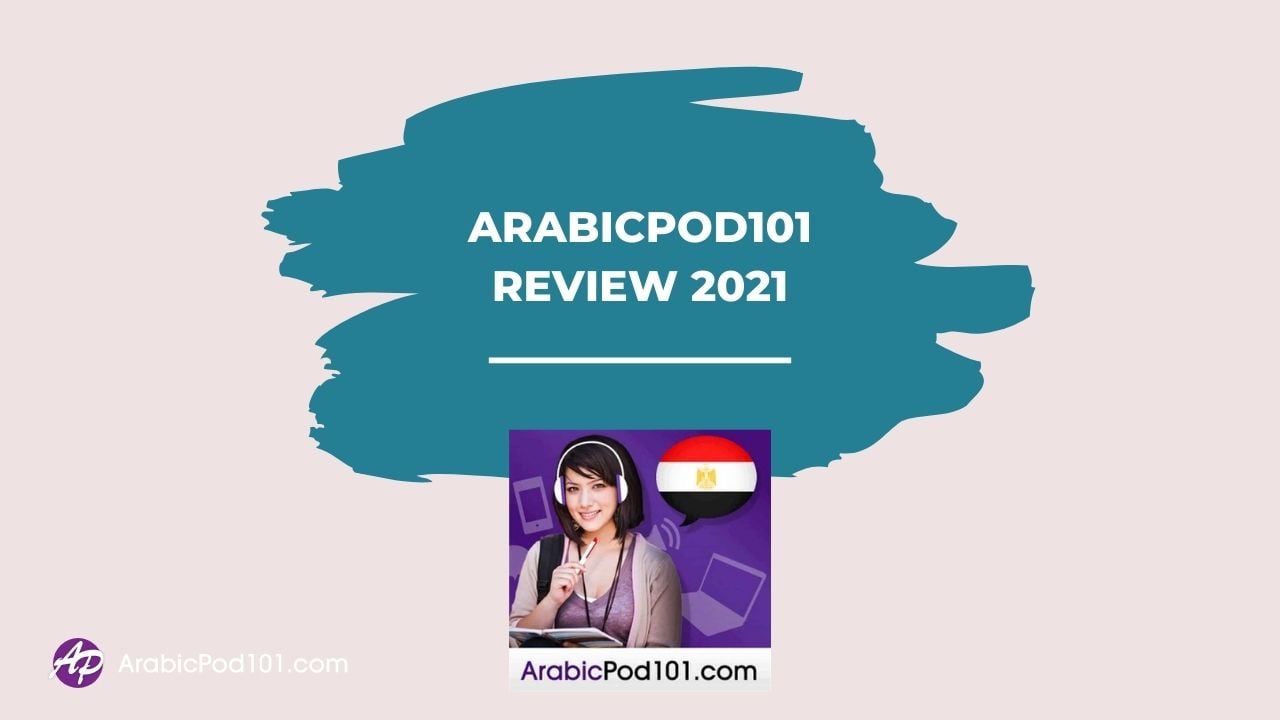
This article is a review of ArabicPod101.com, an online resource for learning to speak Arabic through audio podcasts.
In this review, I'll take you inside the premium members area and show you the main features of the website. I’ll then give you my honest assessment of the quality of the product, so that you can decide whether it's the right one for you.
Pro Tip
By the way, if you want to learn Arabic through stories, not rules, then I have some great news for you!
My course, Arabic Uncovered, teaches you Arabic through the StoryLearning® method! It’s fun, easy, and effective! Get your free 7-day trial here.
ArabicPod101 Review: Summary
The Good
- Very substantial – plenty of lessons for all levels of Arabic
- Easy to use lesson format – audio lessons and a handy mobile app
The Bad
- Dialogues are too short
- Dialects change from lesson to lesson
- Too much “teaching”, not enough Arabic
- Some features appear incomplete
- Endless advertising and up-selling on your profile, even after you sign up
The Cost
A Premium ArabicPod101 subscription costs $180 USD per year.
The Verdict
ArabicPod101 is a good, engaging resource, especially for beginners and lower levels.
Their bite-sized approach to study materials makes it ideal for busy people and those who struggle with motivation, but you’ll still have to put in considerable effort to learn the language.
What Is ArabicPod101?
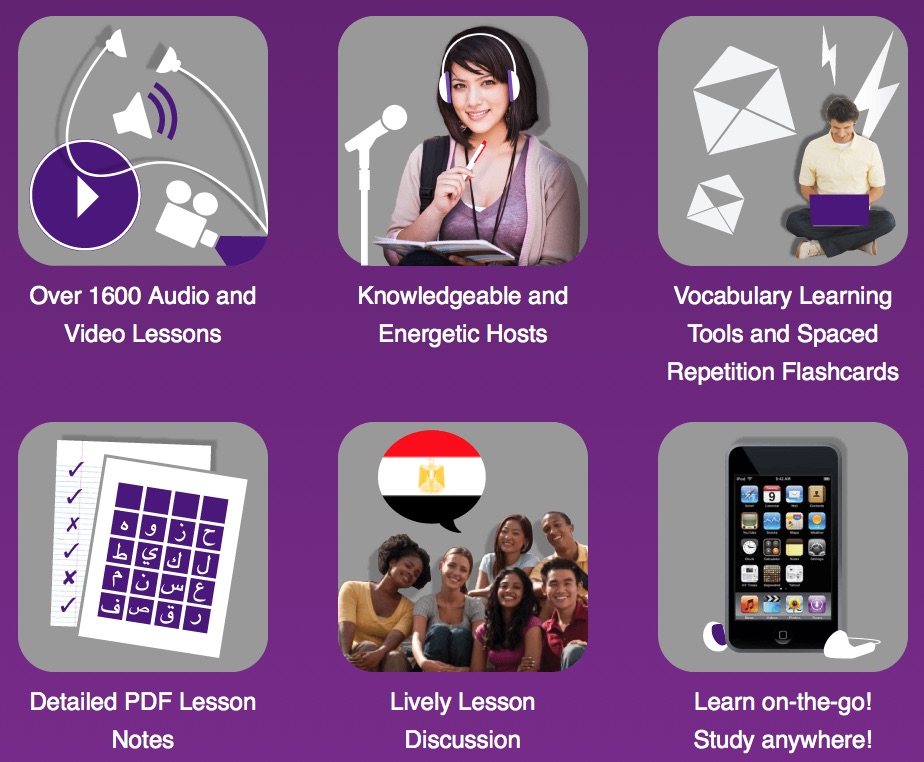
ArabicPod101 is an online subscription programme that teaches Arabic to learners of all levels.
Subscribers get access to an extensive library of Arabic audio and video lessons, as well as a number of other learning tools, such as Arabic flashcards, an English-Arabic dictionary, and Arabic alphabet writing practice sheets.
All of the content included in the premium subscription is available to access through a web browser or through a handy mobile app.
A Look Inside ArabicPod101
Lessons in ArabicPod101 are organised into five levels. Each level has different ‘seasons', or sets of lessons, which are an average of 25 lessons long (although some are considerably longer or shorter).
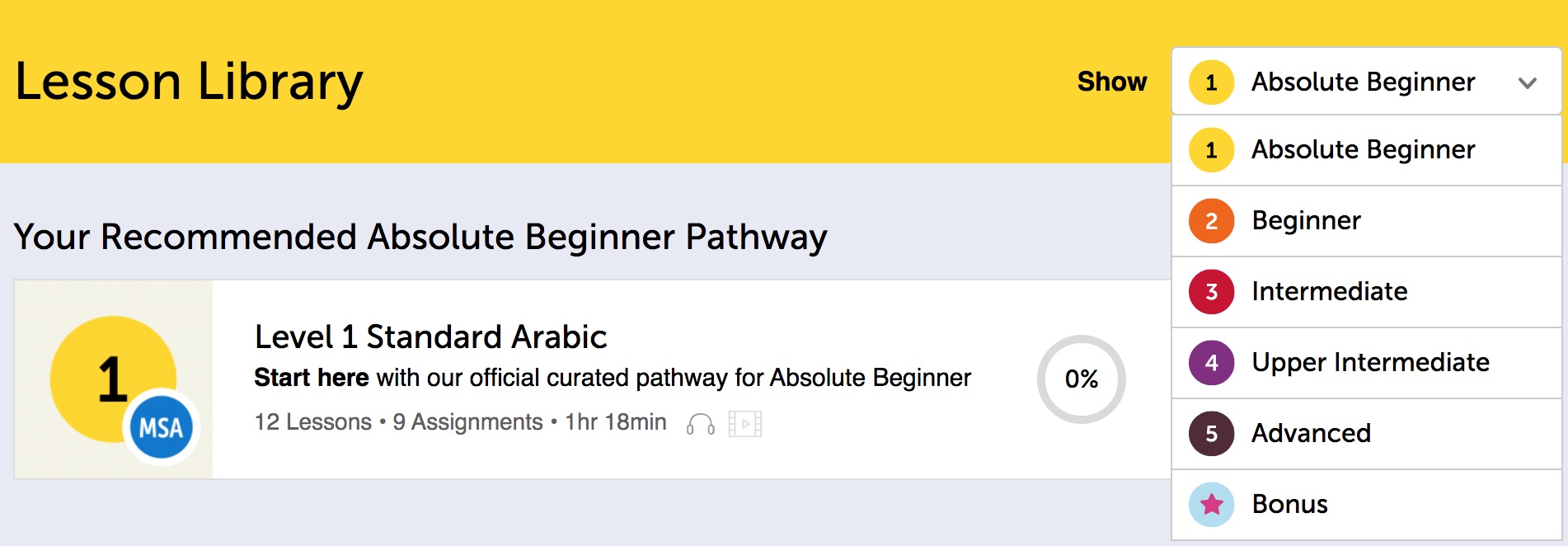
This adds up to literally hundreds of Arabic podcast lessons, which means ArabicPod101 is quite a substantial resource.
That said, with so much content to choose from, it's difficult to know where to start.
One helpful feature is called ‘Learning Paths'. With these paths, you are free to choose specific topics or course structures, in line with your level and what you most want to learn.
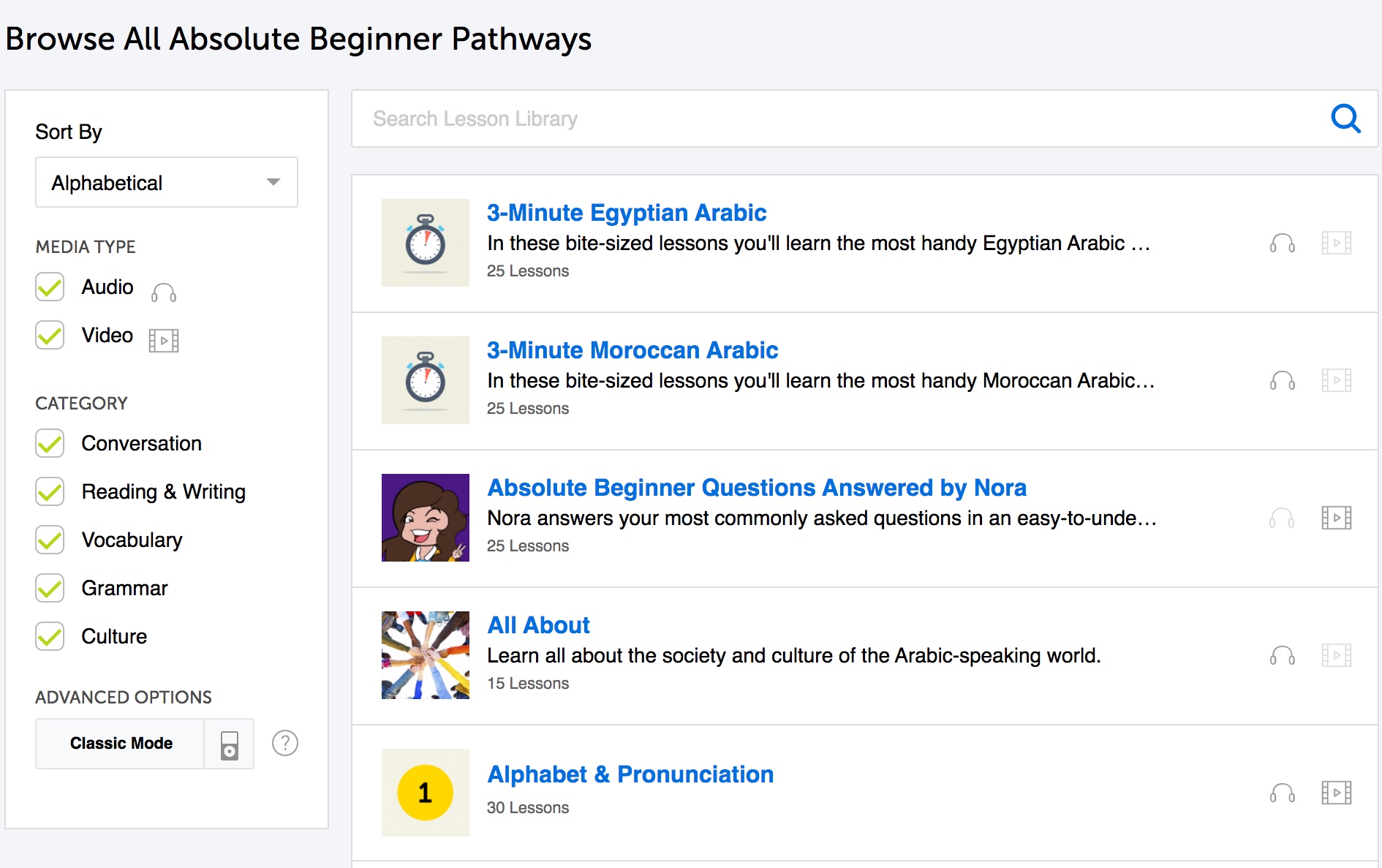
For example, beginners can choose from learning paths like ‘Can Introduce Yourself’, ‘Living in the Arab-Speaking World’, or ‘Daily Routines in Arabic’.
I like how this option makes it easier for you to choose a starting point. The paths are helpful if you’re learning Arabic for a specific purpose – like a vacation to Egypt – and want to streamline that process. It also gives you a clear picture of what you'll have learnt once you complete the learning path.
What's Included In Each Lesson?
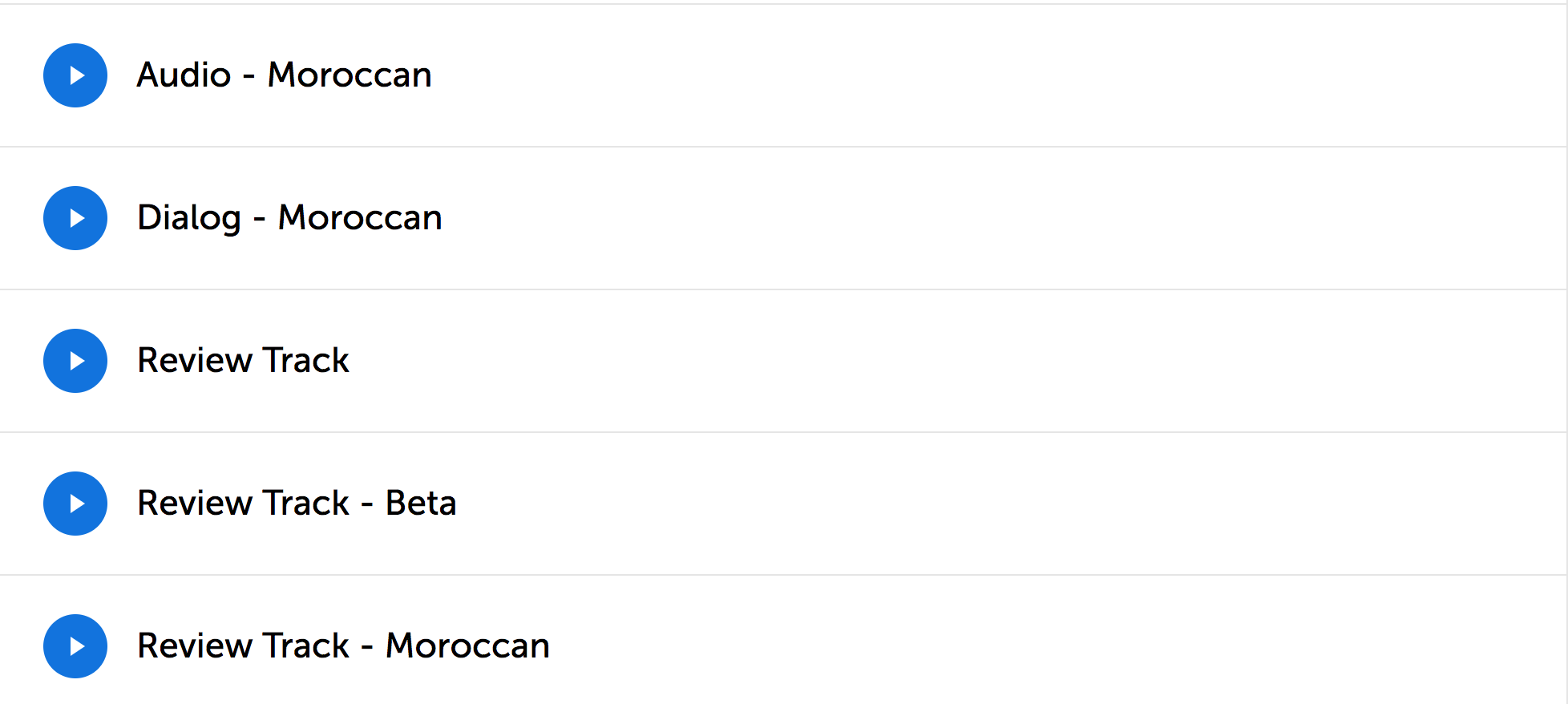
Each lesson contains 2 to 4 audio tracks:
- Full Lesson Audio in Standard Arabic or Egyptian Arabic
- Moroccan Dialect Track (sometimes)
- Review Track
- Dialogue Only Track
Each lesson audio usually follows the same format:
- Dialogue in Arabic – at normal pace, then slowed down
- Repetition of the dialogue with a translation
- Discussion of the story and cultural insights
- Explanation of new vocabulary and phrases
- Explanation of new grammar
After the main lesson, some lessons have another audio track in the Moroccan dialect. This is followed by a review track, and sometimes a dialogue-only track.
You can use the review track for quickly reviewing and practicing new vocabulary. You can use the dialogue-only track to simply hear the Arabic conversation again, without listening to all of the explanations.
This is the most useful track, and the one I recommend you work with the most.
Next, let’s take a look at some at some of the better additional features of ArabicPod101 that you'll find in premium subscriptions…
Interactive Dialogues
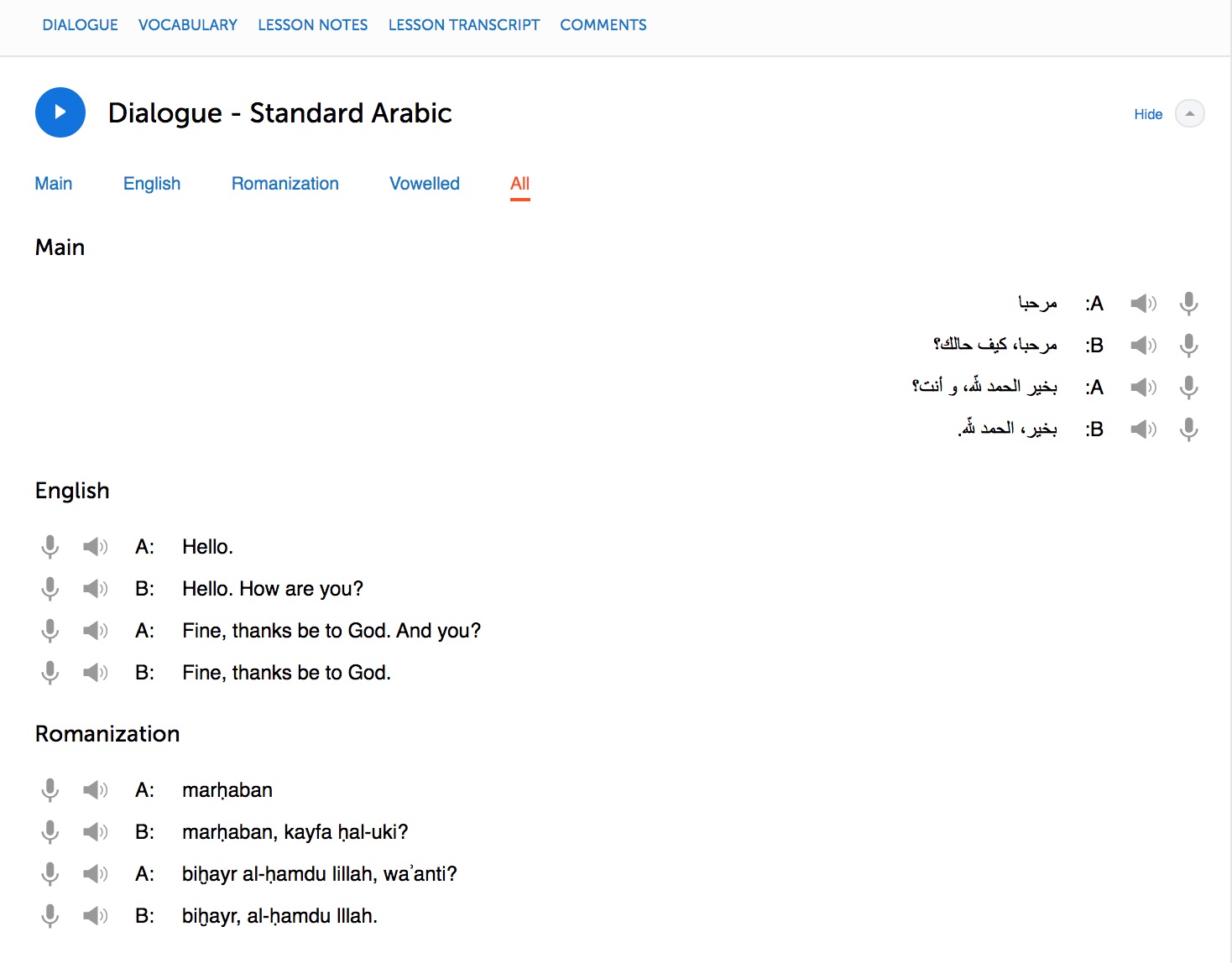
The most rewarding part of ArabicPod101 is the powerful extra features accompanying each lesson.
What stands out the most for me, is the interactive format of the main dialogue. Each line is clickable, so you can click one sentence at a time and hear the audio at your own pace. You can also switch the text between Arabic (voweled and unvoweled), English and romanization (Arabic written with English letters).
This works really well and is ideal for breaking down the dialogues into smaller parts, so you can listen and read at the same time. It's also great for improving your vocabulary and listening comprehension.
Beneath this is a list of vocabulary from the dialogue. Like before, you can click on words to hear the audio (at natural speed and slowed down) and see it in writing. If you have FlashPlayer, there’s an option to record yourself saying the words, which is useful for pronunciation practice.
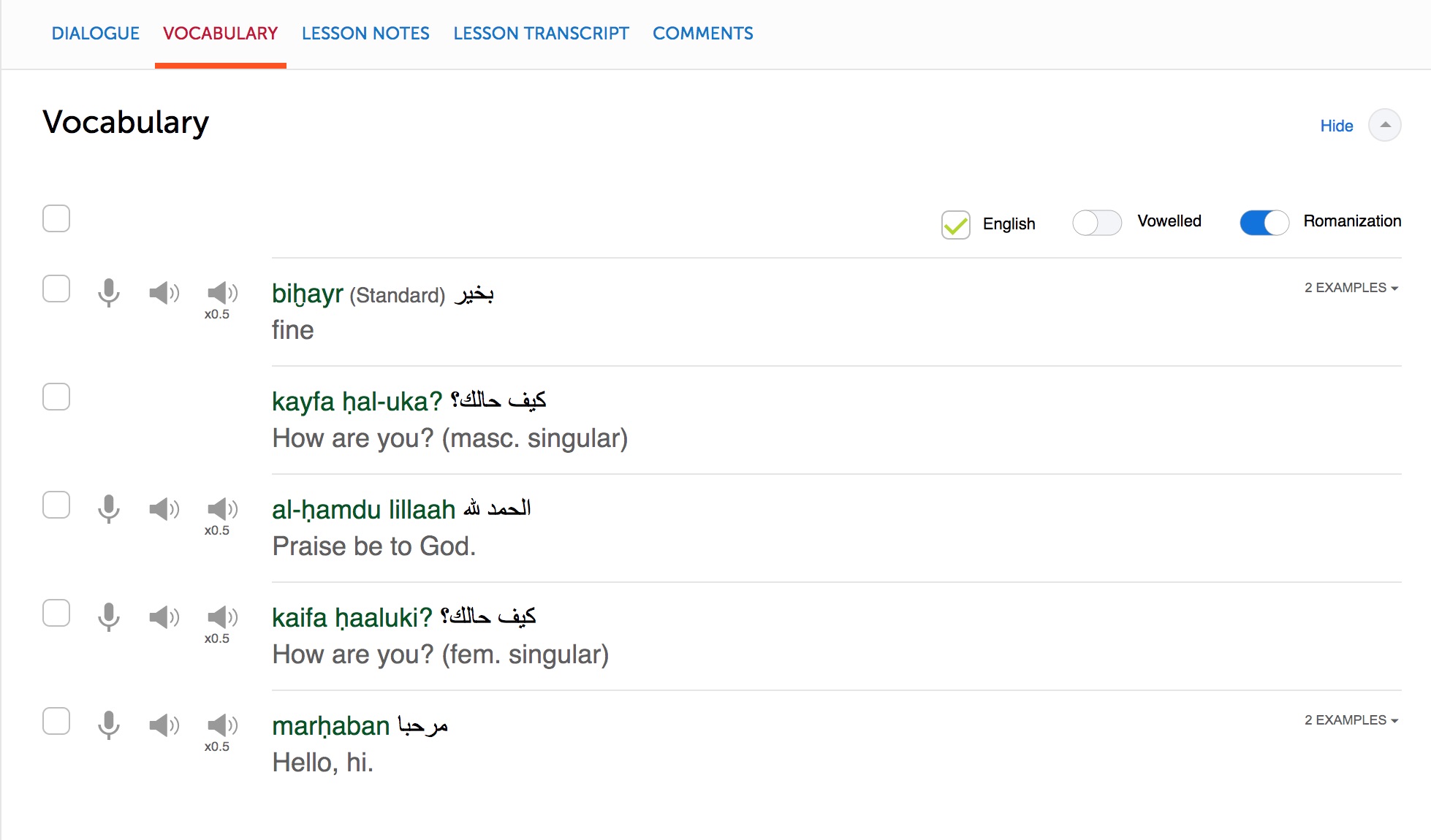
Personalised Flashcards
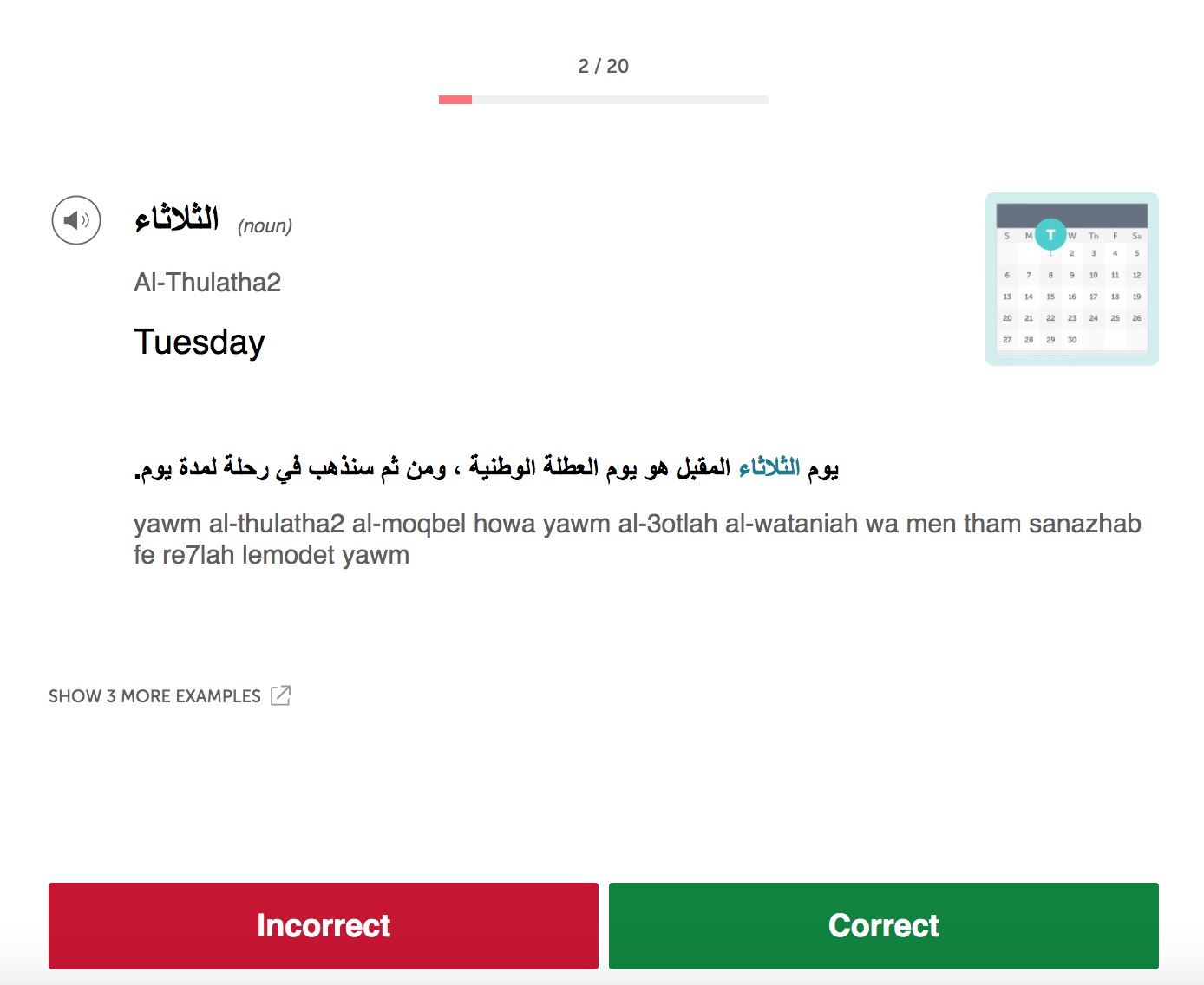
Another cool feature of ArabicPod101 is the built-in flashcard system.
This is an easy-to-use, handy tool that lets you build your own flashcard decks. You can choose any vocabulary you want to practice from your lessons, and save these words to Flashcards. They’re fully-customisable decks that use a spaced-repetition system to help you memorize new words.
It’s not an ideal system, though. As nice as the flashcards are, they only show you words in isolation. It's a pity, because it’s much more effective to learn Arabic words in context. Since that’s not an option with ArabicPod101, this potentially useful flashcard tool is going to do nothing for your fluency.
Downloadable Lessons
All of the lesson audios and transcripts can be downloaded. This is optional and mostly there for those who need to work offline. They’re basically just MP3 files and PDF versions of the lessons on the website – no more.
While I can see the value in downloadable podcasts, there wouldn’t be much use for printed transcripts, since you can’t hear the audios. Some learners find that reading printed notes helps to reinforce their lessons, though, and if this is you, it’s good to have.
Bonus PDFs For Beginners
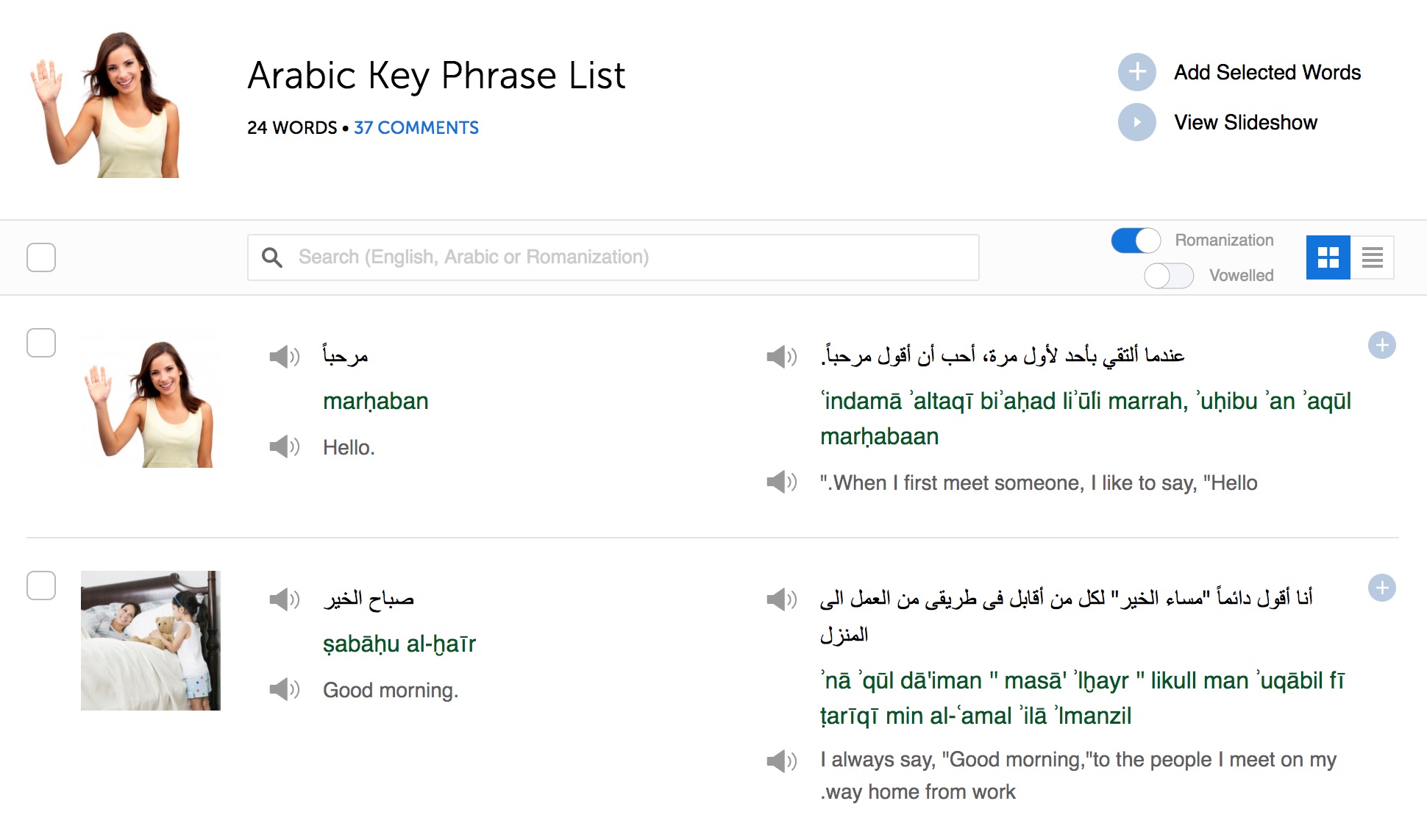
In addition to the lessons, there are some extra resources for beginners, which you’ll find valuable if you’re studying Arabic for the first time.
The early days of learning are quite tricky, because you need to get a basic understanding of the grammar and phonology – not to mention the Arabic alphabet! Trying to untangle it all from various websites will just make you cranky and hinder your progress. Here, it's all in one place:
- Overviews of the language
- Arabic pronunciation chart
- Introduction to Arabic grammar
- Key Arabic phrases & vocabulary lists
- Arabic alphabet practice worksheets
Other Notable Features
There are a couple of other cool features. One is a quiz function, which gives you quick vocab and writing tests based on language from the lessons – although it doesn’t come with every lesson.

I also like the Arabic-English/English-Arabic searchable dictionary. This dictionary is accessible from your dashboard, and contains language from the lessons. It’s pretty handy, as there’s an audio option with each word.
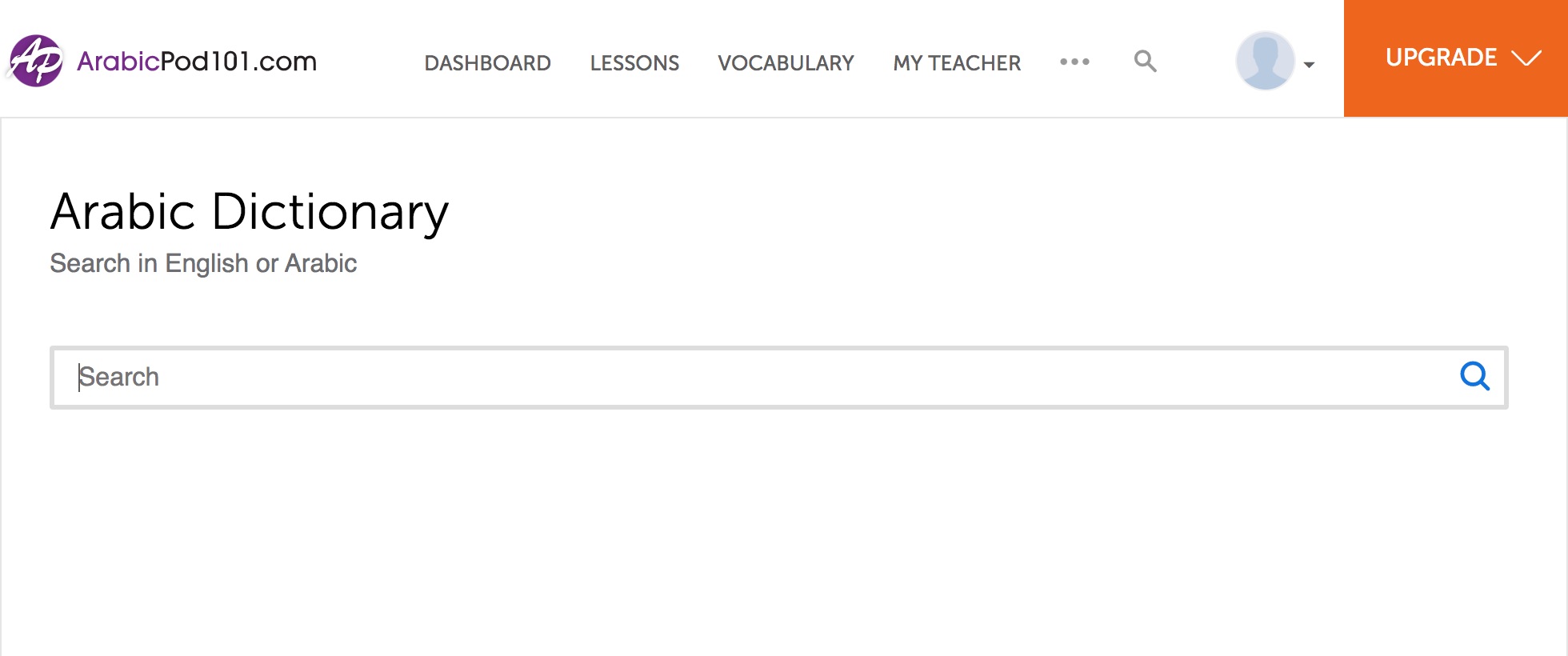
ArabicPod101 Review: What I Liked
There are quite a few things I really like about ArabicPod101…
- It's a very substantial resource. There are plenty of great lessons and useful worksheets for beginners and lower levels, and the library is updated regularly with new material.
- The course is well-designed. Selecting and producing graded material for an entire language course is no easy feat. The content is impressive, though, with a good variety of lesson types. Grammar points and language vocabulary get repeated over the course of each level, which helps reinforce what you've learnt.
- The difficulty levels are just right. Once you figure out your current level and get going, you'll find that the progression from level to level is quite logical.
- Vocabulary is well-selected and the dialogues are based on life-like situations. This means the lessons teach useful language (the kind of Arabic that's actually spoken by people in Arabic-speaking countries).
- The line-by-line clickable dialogues with audio, transcription and translation are AWESOME. In my opinion, this is the main benefit of the product.
- Interesting audio blogs at the advanced level. These are 1 to 2-minute audio lessons where you can listen to a native speaker talking about cultural topics like Egyptian history, folklore or music. I like these mainly for the uninterrupted listening opportunity.
- The handy mobile app can be downloaded to smartphones and tablets, which makes it very easy to listen to podcasts or videos on-the-go. You can even use the line-by-line audio feature on your phone.
ArabicPod101 Review: What I Don't Like
In spite of the positives, there are also quite a few significant downsides to ArabicPod101…
- The quality is inconsistent. Some lessons are awesome, whereas others are very poor. For one, the Arabic dialects seem to change from pathway to pathway, without explanation. This isn’t helpful at all when you’re learning a language for the first time – particularly Arabic, where different dialects are essentially different languages. Some lessons in Standard Arabic include a repeat of the dialogue in the Moroccan dialect. To me, this isn’t logical. It would be better to divide the course into separate dialectal modules. There are some lovely presenters (like Peryhan, who speaks Egyptian Arabic), but others speak too fast or mumble, so they’re hard to understand. There are also transcripts with no translation, and translations that need editing.
- The podcasts use too much English and not enough Arabic. This is good for beginners, but frustrating as your level improves. You'll probably start to feel that there's too much English in each episode compared to the amount of Arabic you're hearing. This is certainly the case for me when I reach advanced levels – I feel a need for more substantial, higher level texts that I can sink my teeth into. Even the advanced level dialogues are all very short. This is understandable seeing as it's a short podcast, but some learners may find it frustrating.
- There is a lot of advertising, up-selling, and cross-promoting related products (by way of emails, on-site banners etc) even after you sign up, which gets irritating when you've already paid for the product. It certainly detracts from the user experience.
- The resources seem to be incomplete,which is disappointing for something you pay good money for. Most noticable is that the information across the different study tools is not always consistent. For example, some words in the database don't come with audio recordings, while others have inaccurate translations. The Arabic dictionary needs considerable attention, as does the grammar bank! Some inconsistencies within the pathways are confusing, too. Like lessons in the wrong categories or levels, or mismatched dialogues and audios. I wouldn’t call these deal-breakers, but they do leave you feeling a bit neglected!
- The vocabulary lists and flashcards work with single words out of context, which is a big missed opportunity. It's much more effective to learn words in context. If you're a regular reader, you'll know how strongly I feel about this! Of course, you can see the words in context within the dialogues, and there are often sample sentences in the flashcard programme (although these often make no sense.) But I'm a big believer in keeping words in full sentences at all times, especially when revising.
- Lots of teaching, not much immersion. One issue I have with the lessons is, ironically, the fact that they are just that: lessons. What do I mean by this? In a 15-minute lesson, you’ll be lucky to hear 30 seconds of sustained listening to Arabic (the dialogue). The rest is teaching explanations of vocabulary and grammar. It’s not that the teaching isn't useful or good quality, it's just that you need to spend more time immersed in Arabic if you actually want to learn it! I would like there to be more extensive listening, so you can just hear and absorb the language without always having to learn something new.
- Vocabulary lists from the lessons don't always contain all the useful words from the dialogues. Instead, they're words that are related to the topic… or even random prepositions and articles! There’s no harm in seeing related vocabulary, but it would be far more useful to provide the best of the vocab you've just learned. After all, if you hear a new word in the lesson and want to know what it means, you shouldn’t have to search the dictionary for the meaning (and from there, export it to a flashcard deck). This just interrupts the user experience.
How Much Does ArabicPod101 Cost & Is It Worth It?
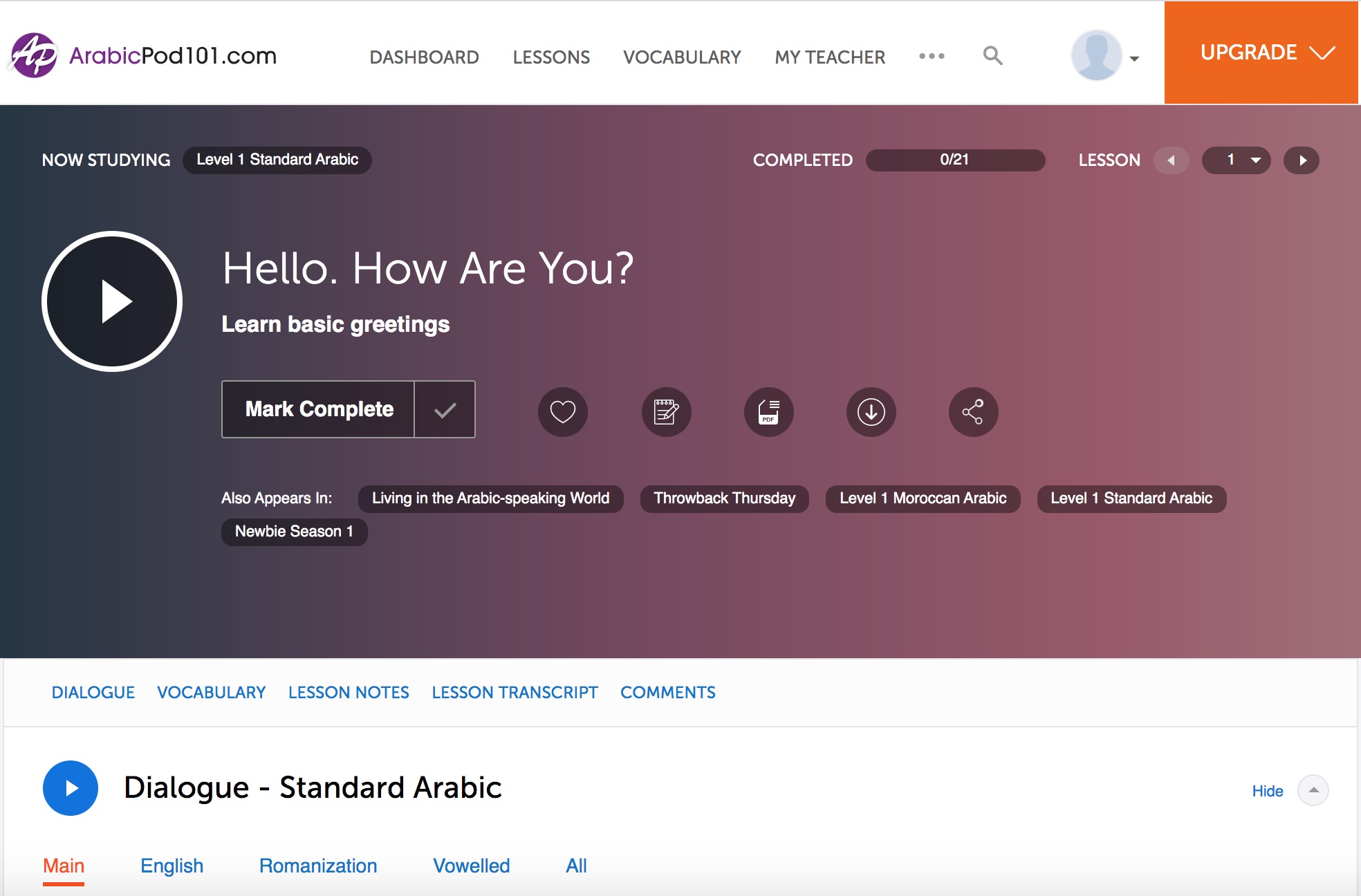
ArabicPod101 works on a freemium model: you can create a free account that comes with a few early lessons and freebies, but to access the good stuff, you’ll need to pay for a subscription. Most of the best content and cool features are only available to paid subscribers.
There are three subscriber levels and as with most subscriptions, the longer you subscribe for, the cheaper the deal. The prices seem quite reasonable, in my opinion.
If you take a one-year premium subscription as your baseline: this costs $180 – a lot more than the cost of a book, but substantially less than other commercial products. For example, Rosetta Stone ($399) or Pimsleur ($345 for 30 lessons.)
On the whole, I think ArabicPod101.com is a substantial and well-made resource for learning Arabic that's easy to consume. And, despite my issues with the teaching format, I think you'll find it useful if you decide to sign up.

Olly Richards
Creator of the StoryLearning® Method
Olly Richards is a renowned polyglot and language learning expert with over 15 years of experience teaching millions through his innovative StoryLearning® method. He is the creator of StoryLearning, one of the world's largest language learning blogs with 500,000+ monthly readers.
Olly has authored 30+ language learning books and courses, including the bestselling "Short Stories" series published by Teach Yourself.
When not developing new teaching methods, Richards practices what he preaches—he speaks 8 languages fluently and continues learning new ones through his own methodology.









































